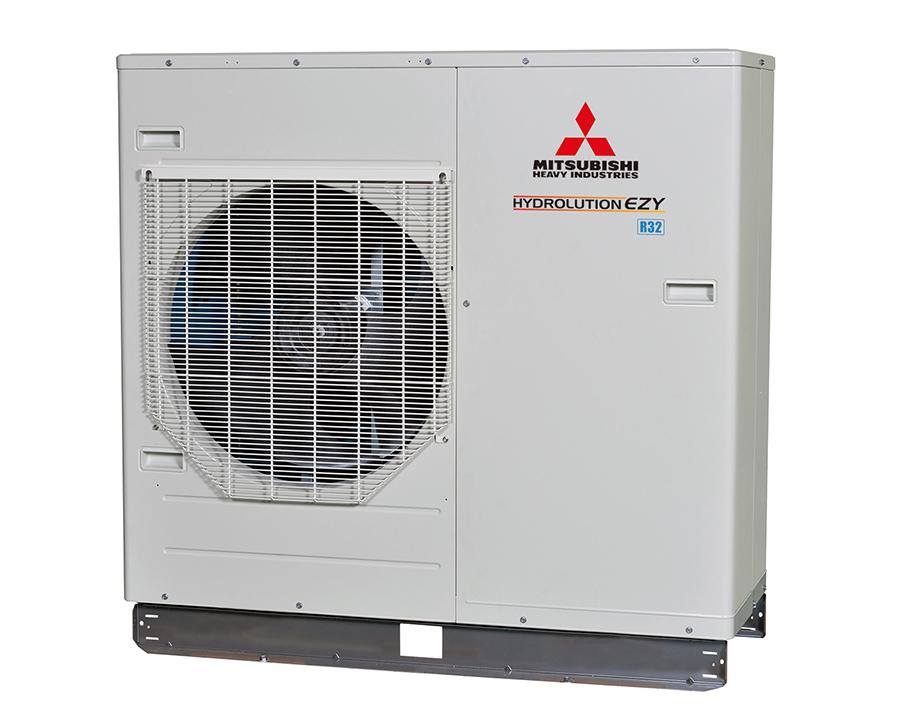Mitsubishi Heavy Industries Thermal Systems (MHI Thermal Systems), a unit of Mitsubishi Heavy Industries, has unveiled a monobloc air-to-water (ATW) heat pump to replace conventional boilers in new and existing buildings.
The Hydrolution EZY heat pump is available in two versions, with outputs of 10 kW and 14 kW.
The systems use difluoromethane (R32) as the refrigerant and can ensure “exceptional performance,” even at temperatures as low as -25 C, according to the manufacturer.
“The integrated water heat exchanger in the outdoor unit simplifies installation compared to the split-type systems, which requires both refrigerant piping and water piping,” it said in a statement.
MHI Thermal Systems also said that the new heat pumps feature an unspecified improved anti-vibration technology.
Popular content
“This structure effectively reduces sound power levels, including noise, to 60dB (A) in the 10kW class model, even when running at full capacity,” it said. “Additionally, the addition of a quiet mode, further reducing operational noise, ensures compliance with various noise regulations, particularly important in densely populated residential areas.
pv magazine print edition
The seasonal, December and January edition of pv magazine reveals the much-anticipated winners of this year’s pv magazine Awards. We also consider the ramifications of the current global oversupply of solar panels, Australia’s prospects of refining battery raw materials, and examine how the European Union’s green hydrogen ambitions are developing.
MHI Thermal Systems also claims that the new product can produce domestic hot water with temperatures of up to 60 C when outdoor temperatures hit -25 C. It did not provide additional technical details, however.
In March 2023, MHI Thermal Systems unveiled a residential air-source heat pump using propane (R290) as the refrigerant.
This content is protected by copyright and may not be reused. If you want to cooperate with us and would like to reuse some of our content, please contact: editors@pv-magazine.com.



Please, can you send me an information on how much square area can heat?
If the heat exchanger is inside the unit, and the temperature is down near the -25C/-13F design parameter, if we assume that the unit or the electricity may shut off, what prevents the water in the lines from freezing and damaging the unit? Are cold climates intended to use a loop of glycol and a second water-water heat exchanger in the building? Or is it assumed that the electricity will always stay on, and that the heat pump will be running constantly?
Brilliant yet simple question Michael, still new to the trade so at first this sounded promising. But after reading your rebuttal, one can only assume that this is impractical for climates under or around that 0c 32f point. Unless like you said some sort of a glycol mixture is used.
Thank you Mike
You answered the question you’d have to use glycol.
Mr. Gallant, you sir are spot on with your observation and conclusion. We have a gas cook stove that only has top burners when the power is out. Our thinking was this would be useful to heat our house should the power stay off for an extended period. Of course the asshats in government want to thwart the logic that behooves this thinking. We have come so far to modernize society and now the stupidity of government is here to f it all up. Regards sir.
This is exactly what I was just wondering. While I love the thought of this, external water lines In NH are just a big no no for so many reasons.
What temperature will the flow and Return pipe work be to n existing radiator system
The linked article from March 2023 is about a Mitsubishi Electric product: Mitsubishi Heavy Industries is a different company.
I have used an air to water monoblock system in the Austrian Alps since 6 years. The air to water heatpump is directly connected to the inhouse fluid with a mixture of glycol for the extreme case of the system being cut off during freezing temperatures. No separated 2 liquid systems are then required. My long term COP is 3 on average, in the last 2 years the COP is 3.2 optimzing flow and temperature of the floor heating system. However I saw recently another smarter solution installed: the plumber made a drain valve on a very low point of the fluid lines leading outside, so in the extreme case the fluid can be removed from the exterior section.
As others said, Mitsubishi Heavy Industries is a completely different company than Mitsubishi Electric. Electric is the well know A/C company, and the Heavy Industries is less known. Bort make A/C but with different parts
I would like to learn more about the product I am a plumber in Southern California region if any residents are installing these units in my region. Thank You Ryan B. W/ Above And Beyond Plumbing & Drain out of the city of Laguna Niguel